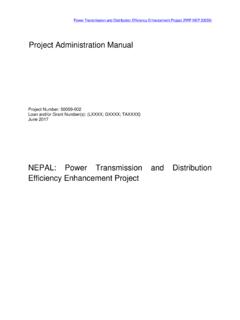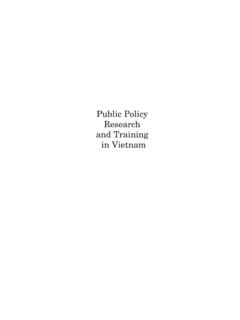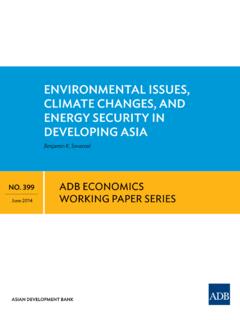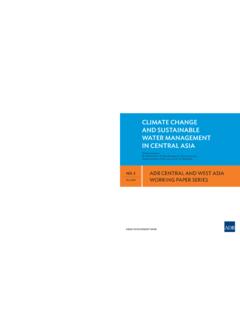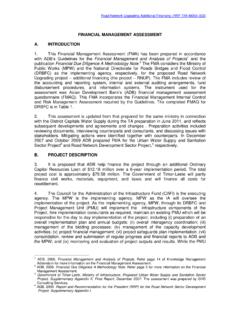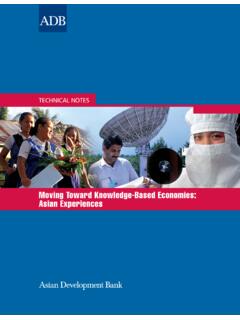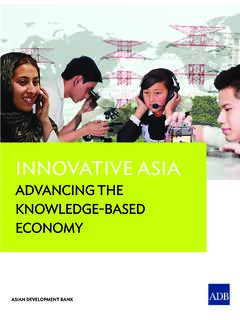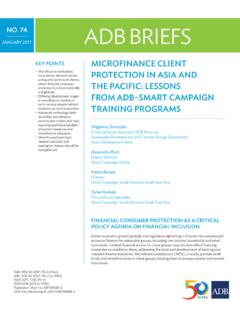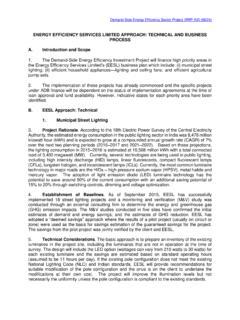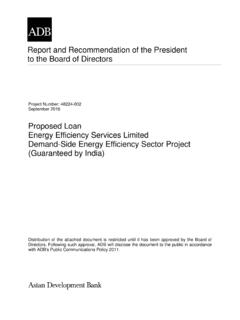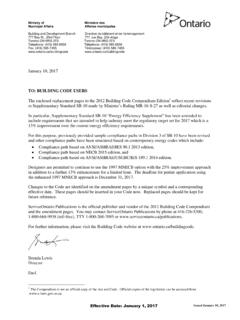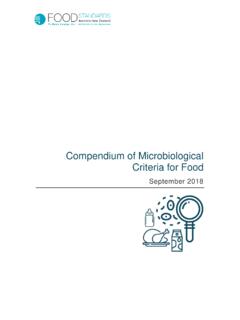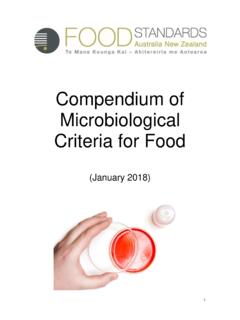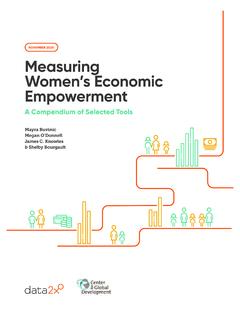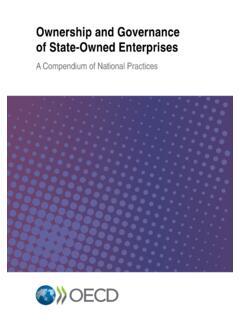Transcription of POLICY ACTIONS FOR COVID-19 ECONOMIC RECOVERY
1 A compendium OF POLICY BRIEFSE dited by Ramesh Subramaniam, Alfredo Perdiguero, Jason Rush, and Pamela Asis-LayuganPOLICY ACTIONS FOR COVID-19 ECONOMICRECOVERYJUNE 2021A compendium OF POLICY BRIEFSE dited by Ramesh Subramaniam, Alfredo Perdiguero, Jason Rush, and Pamela Asis-LayuganPOLICY ACTIONS FOR COVID-19 ECONOMICRECOVERYJUNE 2021 Creative Commons Attribution IGO license (CC BY IGO) 2021 Asian Development Bank6 ADB Avenue, Mandaluyong City, 1550 Metro Manila, PhilippinesTel +63 2 8632 4444; Fax +63 2 8636 rights reserved. Published in 2021. ISBN 978-92-9262-925-0 (print); 978-92-9262-926-7 (electronic); 978-92-9262-927-4 (ebook) Publication Stock No. SPR210233-2 DOI: views expressed in this publication are those of the authors and do not necessarily reflect the views and policies of the Asian Development Bank (ADB) or its Board of Governors or the governments they represent. ADB does not guarantee the accuracy of the data included in this publication and accepts no responsibility for any consequence of their use.
2 The mention of specific companies or products of manufacturers does not imply that they are endorsed or recommended by ADB in preference to others of a similar nature that are not making any designation of or reference to a particular territory or geographic area, or by using the term country in this document, ADB does not intend to make any judgments as to the legal or other status of any territory or work is available under the Creative Commons Attribution IGO license (CC BY IGO) By using the content of this publication, you agree to be bound by the terms of this license. For attribution, translations, adaptations, and permissions, please read the provisions and terms of use at # CC license does not apply to non-ADB copyright materials in this publication. If the material is attributed to another source, please contact the copyright owner or publisher of that source for permission to reproduce it. ADB cannot be held liable for any claims that arise as a result of your use of the contact if you have questions or comments with respect to content, or if you wish to obtain copyright permission for your intended use that does not fall within these terms, or for permission to use the ADB to ADB publications may be found at : In this publication, $ refers to United States dollars, unless otherwise stated.
3 ADB recognizes China as the People s Republic of China and Korea and South Korea as the Republic of photos by ADB unless otherwise design by Jordana and Figures ivForeword vAbbreviations viExecutive Summary viiCHAPTER 1: Tackling the Impact of COVID-19 1 POLICY Lessons from a Pandemic: The Korean Experience 2 Lessons We Can Learn from New Zealand s COVID-19 Strategy 7 How Small and Medium-Sized Enterprises Can Bounce Back from the COVID-19 Crisis 14 CHAPTER 2: Protecting the Poor and Vulnerable 21 Coming Out Stronger from COVID-19 : POLICY Options on Migrant Health 22 and Immigration 22 Social Protection Interventions as Medium- and Long-Term Responses to the Pandemic 30 CHAPTER 3: Accelerating Digital Transformation 39 Building the Infrastructure for Digital Finance during COVID-19 and Beyond 40 Fostering Resilient Start-Up Ecosystems in the New Normal 49 An Equity-Focused Digital Strategy for Education during and after COVID-19 55 POLICY Lessons from Coursera: Mitigating Education Disruptions and Job Loss 64 CHAPTER 4: Reigniting Southeast Asia and Bouncing Back Stronger Together 70 Harmonizing Health Standards for Post-Quarantine COVID-19 Settings 71 Adaptive Control of COVID-19 Outbreaks.
4 POLICY Approaches 77 Enhancing Readiness for Large-Scale Distribution of the COVID-19 Vaccine 85 POLICY Options to Accelerate Travel and Tourism RECOVERY in Southeast Asia 93 About the PACER Dialogues 102 About the B-I-G Program 107ivTables and Epidemic Control Measures for a Post-Lockdown Period Minimum Measures for a Post-Lockdown Period COVID-19 Restrictions Based on the Transmissibility Level Classification of Districts Based on Case Counts Restrictions Based on Zone Classification 81 List of 2020 PACER Dialogues The Treasury s Living Standards Framework Key Challenges for Micro, Small, and Medium-Sized Enterprises Framing the POLICY Dimensions of Shock-Responsive Social Protection A Stylized Illustration of the Patterns of Shock Cycles Simulations in Bihar State Simulations in Jakarta, Indonesia 83vThe coronavirus disease ( COVID-19 ) has had catastrophic health, social, and ECONOMIC impacts worldwide. While hope is on the horizon, a multitude of challenges ACTIONS and innovative ideas are required to address this unprecedented crisis.
5 While countries are racing to identify rapid and effective responses to the pandemic, it is also important to lay the groundwork for a future that can better ensure sustainable, inclusive, and resilient growth. As the COVID-19 pandemic accelerated around the world, the Asian Development Bank (ADB) sponsored the POLICY ACTIONS for COVID-19 ECONOMIC RECOVERY (PACER) Dialogues to share cutting-edge knowledge and best practices that could help countries accelerate ECONOMIC RECOVERY and strengthen cooperation to mitigate the devastating effects of compendium of POLICY briefs from the PACER Dialogues highlights discussions, recommendations, and actionable insights for Southeast Asian countries and the People s Republic of China as they pave the way for post- COVID-19 convened the PACER Dialogues from June to September 2020, under the framework of the Brunei Darussalam Indonesia Malaysia Philippines East ASEAN Growth Area (BIMP-EAGA), the Indonesia Malaysia Thailand Growth Triangle (IMT-GT), and the Greater Mekong Subregion (GMS) Capacity Building Program, or B-I-G Program.
6 We hope this compendium will guide POLICY makers as they traverse multifaceted challenges in the wake of the pandemic and contribute to the crucial work of POLICY architects, industry players, academics, development practitioners, and other stakeholders as they collaboratively work toward overcoming the worst effects of SubramaniamDirector General, Southeast Asia DepartmentAsian Development BankForewordviADB Asian Development BankAMC Advance Market CommitmentASEAN Association of Southeast Asian Nations B-I-G Program Brunei Darussalam Indonesia Malaysia Philippines East ASEAN Growth Area (BIMP-EAGA), the Indonesia Malaysia Thailand Growth Triangle (IMT-GT), and the Greater Mekong Subregion (GMS) Capacity Building ProgramBIMP-EAGA Brunei Darussalam Indonesia Malaysia Philippines East ASEAN Growth AreaCBDC central bank digital currencyCEPI Coalition for Epidemic Preparedness InnovationsCOVAX COVID-19 Vaccines Global AccessCOVID-19 coronavirus diseaseEdTech education technologyGAVI Global Alliance for Vaccines and ImmunizationsGDP gross domestic product GMS Greater Mekong SubregionILO International Labour OrganizationIMT-GT Indonesia Malaysia Thailand Growth TriangleIOM International Organization for Migration MERS-CoV Middle East respiratory syndrome coronavirusMSMEs micro, small, and medium-sized enterprisesPACER POLICY ACTIONS for COVID-19 ECONOMIC RECOVERY R&D research and developmentRt reproductive rateSARS severe acute respiratory syndromeSMEs small and medium-sized enterprisesUHC universal health coverageUNESCO United Nations Educational.
7 Scientific and Cultural OrganizationUS United StatesVAT value-added tax WHO World Health Organization WTTC World Travel & Tourism CouncilAbbreviationsviiChapter 1: Tackling the Impact of COVID-19 Faced with the immense task of protecting both lives and livelihoods, countries need to craft POLICY responses that can mitigate the ECONOMIC costs of the coronavirus disease ( COVID-19 ) crisis while minimizing risks to society. Kwangchul Ji discusses the whole of government approach adopted by the Republic of Korea to protect public health and address the impact of COVID-19 , and the successful ECONOMIC and fiscal measures employed to cushion the economy from the pandemic s fallout and prepare for ECONOMIC RECOVERY . The Republic of Korea s strategy in tackling COVID-19 , widely recognized as an international best practice, has been anchored on transparency and open communication, public private partnerships, data-driven deployment of public health measures, and innovative solutions hinged on technology and big data.
8 New Zealand s well-being approach and success in combating COVID-19 also provide valuable lessons. Mark Blackmore and Mario Di Maio highlight New Zealand s ECONOMIC response in three waves, guided by the principles of timeliness and fiscal sustainability, targeted to those who need it, and proportionate to the level of the ECONOMIC shock. The phased approach has helped prevent the spread of COVID-19 while kick-starting RECOVERY and resetting the economy, focusing on trade RECOVERY to sustain supply chains and avoid and medium-sized enterprises (SMEs) are considered the backbone of the Asian economy, making up more than 96% of Asian enterprises and contributing 42% of gross domestic product (GDP). In the Association of Southeast Asian Nations (ASEAN), SMEs provide 50% of employment. An ADB survey conducted in four ASEAN economies found that more than half of micro, small, and medium-sized enterprises (MSMEs) were facing severe shortages of working capital and inadequate access to formal financial services in the wake of the pandemic, raising concerns about debt service capacity and business sustainability.
9 With rapid and sharp declines in demand, disruptions in ECONOMIC activities, and a surge in job losses worldwide, many SMEs are at risk and bear the brunt of the ECONOMIC crisis. Executive SummaryRamesh SubramaniamDirector General, Southeast Asia Department (SERD), Asian Development Bank (ADB)Alfredo PerdigueroDirector, Regional Cooperation and Operations Coordination Division, SERD, ADBJ ason RushPrincipal Operations Communications Specialist, SERD, ADBP amela Asis-LayuganInstitutional and Capacity Development Specialist (Consultant), SERD, ADBviiiExecutive SummaryPaul Vandenberg discusses measures to help SMEs respond to and begin recovering from the crisis, including tax deferment, credit, wage subsidies, enterprise pivots, and POLICY advice to weather the 2: Protecting the Poor and VulnerableGlobal evidence illustrates that pandemics burden falls disproportionately on poor and marginalized populations, including migrants and their families.
10 The migrant workforce is particularly vulnerable to the ECONOMIC slowdown resulting from the COVID-19 pandemic. As countries act to tackle the crisis, a strong case can be made for an inclusive public health and socioeconomic response to control the virus, restart economies, and stay on track to achieve the Sustainable Development Goals. Migrant-inclusive approaches with universal health coverage as a goal are crucial not only for overcoming the threats posed by COVID-19 , but also for protecting public health at a lower overall cost, leading to improved development outcomes. Patrick Duigan proposes a three-track POLICY agenda to address the complex challenges of COVID-19 to migrant health and immigration. The POLICY agenda aims to reduce transmission risks, mitigate impacts, and leverage opportunities for transformational changes in managing human mobility and Barca and Edward Archibald highlight that COVID-19 necessitates the adoption of social protection systems and the rapid scale-up of social assistance to address the pandemic s impacts.
